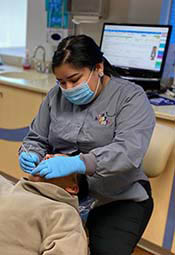Teeth grinding, also called bruxism, occurs commonly in many adults. But if it becomes frequent and excessive, it can pose serious problems. So how do you know when to call your dentist and what can you do to relieve it?
Recognize Symptoms and Consequences of Teeth Grinding
If you grind your teeth excessively and let the condition go untreated, you risk more serious issues later. Excessive teeth grinding can result in:
- Abnormal wear to your teeth.
- Fractured or loose teeth.
- Damage to your jaw, which can evoke hearing loss, TMD (TMJ) or changes in your facial structure.
If these conditions develop, you may end up needing more expensive dental treatments like crowns, bridges or implants. This will obviously cost more money, but also time—doing something most people don’t consider fun.
So how can you detect teeth grinding?
Common occasional teeth grinding can be caused by stress and anxiety and is often done while sleeping. You might not realize you’re doing it, but a partner or child may hear you. Otherwise, you may be grinding your teeth if you notice:
- A constant, dull headache.
- A sore jaw.
- Tooth pain.
- Unexplained loose teeth.
- Fractured teeth.
Missing or crooked teeth or even an abnormal bite may also provoke teeth grinding. And for kids, even allergies or mouth irritations can spark teeth grinding.
About 15% to 33% of kids grind their teeth (webmd.com), and typically do so when their baby teeth emerge, and when permanents poke through. If your child continues to grind his teeth after both sets of teeth have come in, discuss it with his dentist.
Making It Stop: Treating Teeth Grinding
If you grind your teeth at night, your dentist may recommend getting a mouth guard to keep you from doing it.
If stress and anxiety plague you, try to reduce them. Step up your exercise program. Get counseling. Meditate. Listen to soothing music.
Other things you can try to prevent teeth grinding include:
- Reducing consumption of caffeine.
- Avoiding alcohol.
- Avoiding chewing anything besides food (gum, pencils, etc.) since this promotes grinding activity.
- Practice TMD/TMJ exercises to retrain yourself not to grind your teeth.
What’s the Nitty Gritty on Teeth Grinding?
- Occasional teeth grinding is common and probably not a big deal.
- Frequent or excessive teeth grinding, especially after both sets of teeth have come through, can lead to serious mouth and jaw issues.
- You can take steps on your own to try to reduce teeth grinding, but you should always consult with your dentist and repair any damage already done.
If you’re concerned about your own, or your child’s teeth grinding, call MyOrthodontist today to set up an appointment at one of our convenient North Carolina locations. We will treat any dental damage gently and in a timely manner, and work with you to put an end to your teeth grinding.
Are You a New Patient?


